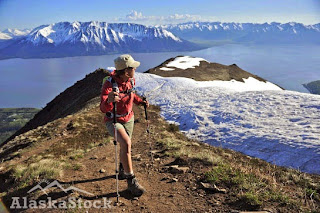
Photo by © Scott Dickerson / Alaska Stock
Alaska's state park system encompasses over 3.3 million acres of rugged, unspoiled land. Some of these parks include the Caines Head State Recreation Area, Kachemak Bay State Park, Denali State Park, and the Eagle Beach State Recreation Area. Perhaps one of the most used is the Chugach State Park located just minutes from Alaska largest populous of Anchorage. Chugach State Park is the third largest state park in America coming in at just under a half a million acres.
Chugach State Park is part of the Municipality of Anchorage and includes the Chugach Mountains that overlook the Anchorage Bowl. The Chugach Mountains, Chugach State Park, and Chugach National Forest all take their name from the Chugach people, the Alaska Native group of people in the region of the Kenai Peninsula and Prince William Sound. The Chugach people are an Alutiiq (Pacific Eskimo) people who speak the Chugach dialect of the Alutiiq language.
Chugach State Park has 28 recognized trail heads, three public campgrounds and multiple interpretative kiosks and sites. Chugach State Park also has the Eagle River Nature Center, operated by a non-profit organization, and is located within the park approximately12 miles from the town of Eagle River.
Chugach State Park is generally considered to have three main sections: North, Central, and South. North park area is approximately from north of the Eagle River section to its border at Pioneer Peak. This area includes the popular Eklutna Lake area. This large glacier created lake also supplies much of Anchorage with its drinking water. The largest mountains of Chugach State Park are also located in the north part of the park. Central park area includes the southern area of Eagle River to the Canyon Road trailhead on the Anchorage hillside. Some of the more popular destinations in this area include the Crow Creek Mine trail, Glen Alps (Flat Top) area, and the South Fork of Eagle River. South park area is primarily the areas bordering Turnagain Arm along Seward Highway. Popular hiking areas include McHugh Creek, Windy Corner, and Bird Ridge which all give panoramic vistas of Turnagain Arm, the Chugach Mountains, and the Kenai Mountains. Traveling along the Seward Highway, there are many viewpoints including the most popular Beluga Point (named after large pods of Beluga whales that frequent the area) and Windy Corner which is a common place to view Dall Sheep near or even alongside the highway.
